Comedy 1 - WordPress.com
advertisement
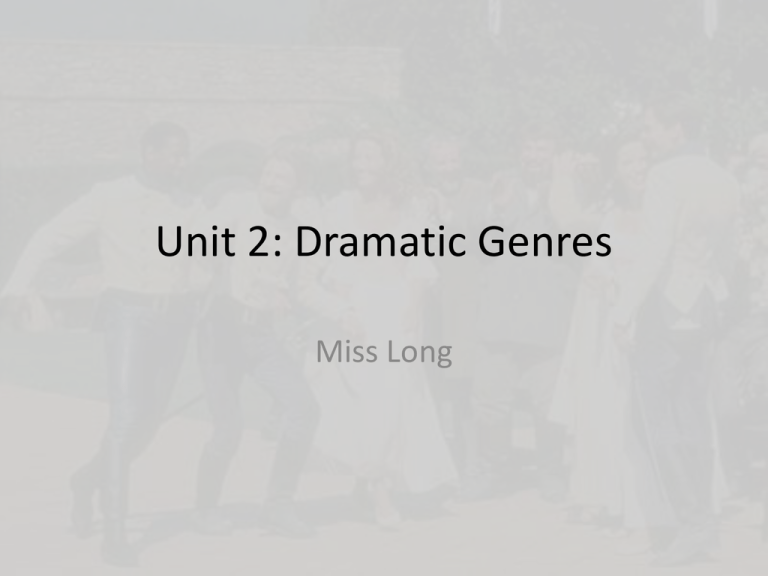
Unit 2: Dramatic Genres Miss Long What will I study? • This unit focuses on Drama and Comedy. You will study two plays that are both comedies: – Much Ado About Nothing, William Shakespeare – The History Boys, Alan Bennett Assessment 2 pieces of coursework: For both plays you will write a 1200-1500 word piece focusing on how an aspect of the comedy genre. 40% of total AS marks 20% of total A Level marks What is Comedy? • What makes you laugh? 5 min brainstorm in groups Agree or Disagree? • What provokes laughter is often ridiculous and excessive • Slapstick is the funniest sort of humour • It is wrong to laugh at someone else’s expense • Comedy is less prestigious than other genres • Comedy is just about making people laugh • Comedy is often more controversial than other genres Theories of Comedy • Superiority-I laugh because I feel superior • Relief-after a build up of tension • Incongruity-when two things are put together that don’t fit, creating an sense of absurdity (ie, a huge gorilla shopping in Marks and Spencers) General features of Comedy Comic Techniques • • • • • • • • • Exaggeration Timing Repetition Slapstick Malapropism Irony/sarcasm Misunderstandings Parody Impersonation • • • • • Wordplay Caricature Ironic juxtaposition Folly Absurdity • https://www.youtube.com/watch?v=EIDquJbD Ff0 • https://www.youtube.com/watch?v=m_Ar_OE QUec The origins of comedy as a literary genre • The word comedy derives from the Greek word, komoida • The origins of dramatic comedy lie in Greek Theatre 5BC • Aristotle wrote about the rules for different types of drama • It was largely thought that there were 2 types of plays Tragedy…. depicts the downfall of a basically good person through some fatal error or misjudgement, producing suffering and insight on the part of the protagonist and arousing pity and fear on the part of the audience. The fatal flaw of the tragic hero leads to their downfall. The bigger they are, the harder they fall – presenting the audience with a man of excessive – wealth or power, makes his eventual downfall – more tragic. Tragic heroes fall victim to external pressures. Fate, evil spirits and manipulative characters all play a hand in the hero’s downfall. Aristotle • ‘No animal but man ever laughs’ • Imitation of inferior people • ‘the laughable is a species of the disgraceful’ • Does not involve pain or destruction Features of Tragedy and Comedy Tragedy Comedy The Romans developed genre of dramatic comedy in several ways • Stereotypical characters (eg, young lovers, angry old men • A sub-plot • A unity of place (all action takes place in same place) • Mistaken identity • Wordplay/misuse of language • Fate-chance meetings • The use of everyday speech and asides to the audience Shakespearean Comedy Comedy through language, clever word play, metaphors and insults. Love is prevalent , often we are presented with sets of lovers who overcome obstacles and unite. Shakespearian comedy often ends with a marriage or even a double marriage! Complex plots, twists and turns. Often ridiculous coincidence and scenario. (Although comedies do follow similar patterns, e.g. the final scene has a celebratory feel when the lovers finally declare their love for each other.) Often a pastoral element (courtiers living an idealised, rural life). The plot is often driven by mistaken identity. • • • As an intentional part of a villain’s plot Part of a character’s disguise Female characters disguised as male characters Defining Shakespearean comedy-Dr Eric Langley (clip 7) • Note down 5 important things about Shakespearean Comedy according to Dr Langley Structure – In simple terms you could describe the basic phases of a dramatic comedy as: HARMONY COMPLICATION DISORDER OR CHAOS RESOLUTION RESTORATION – TASK: In pairs, talk briefly about where you would place each of the events or actions in the simplified model for a comedy that you know (you can use the examples from earlier if you need)
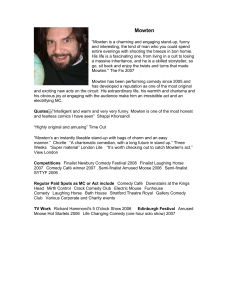
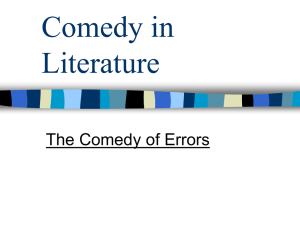
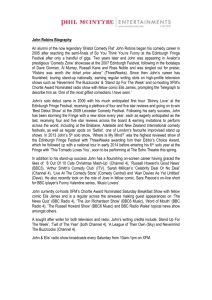
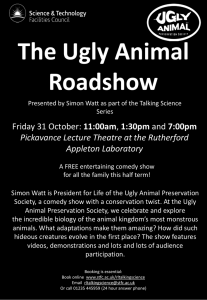
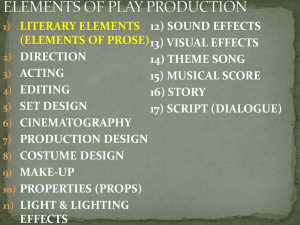
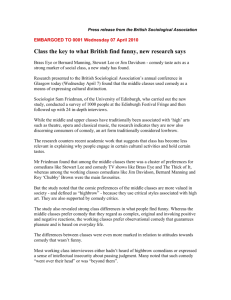
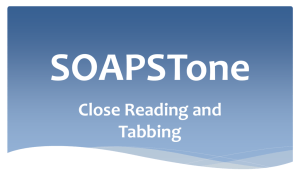
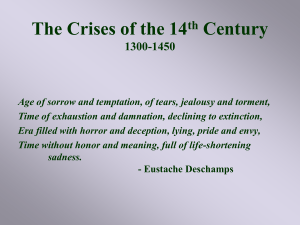


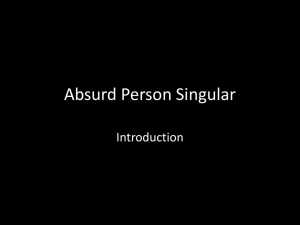
![[Lecture 19] studio system 2 for wiki](http://s2.studylib.net/store/data/005217793_1-c296c1b3b7b87d52a223478e417a702f-300x300.png)